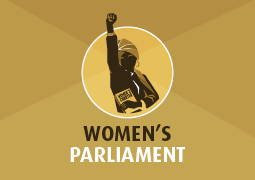
Parliament today held a hybrid 2020 Women’s Parliament with the theme “Generation Equality: Advancing our collective efforts to end gender-based violence and femicide”.
Delivering opening remarks, the Deputy Chairperson of the National Council of Provinces (NCOP) Ms Sylvia Lucas stated that this parliament serves as a strategic platform for leaders to share ideas, engage constructively and come up with solutions on gender-based-violence (GBV). GBV requires multiple approaches and the time for theories is over, Ms Lucas said, therefore the three arms of the state are part of this parliament.
Ms Lucas told Members of Women’s Parliament, including Members of the National Assembly (NA) and the NCOP, that the 2020 Women’s Parliament is a continuation of the 2019 Provincial Review Sessions of the Women’s Charter, which started in the Western Cape. This review assessed the women’s rights regime to identify policy gaps, legislative oversight mechanisms, and barriers to gender equality. She described this women’s parliament as a strategic session seeking to distil points of views that must either shape or influence state policy on gender-based violence.
The Minister of Women, Youth and Persons with Disabilities Ms Maite Nkoana-Mashabane delivered the key-note address. She believes tangible progress has been made to bring about gender equality in political representation and decision-making processes. However, progress is undermined by GBV, which has stained our national consciousness.
In her view, this women’s parliament must strive to identify concrete measures, emergences responses, plans and resources to combat GBV. To contribute to this endeavour since President Cyril Ramaphosa’s announcement of the National Strategy on GBV, her ministry has increased the number of care centres and the police have improved their capacity to deal with crimes and services related to women and children going through the justice system.
Ms Nkoana-Mashabane also referred to the president’s move to include women in the economy through public procurement. If women’s financial situation improves, they will be less dependent on abusive men due to their financial circumstances.
Representing the legislative sector on the topic “Advancing an effective legislative sector in the fight against gender-based-violence and femicide”, the Deputy Speaker of the NA Mr Lechesa Tsenoli contested that there is a need for a collective effort to combat GBV. He claimed that today’s gathering was an evidence of that process.
Mr Tsenoli pointed out that the Legislative Sector Legacy Report provides an overview of the work that still needs to be done and a need for a coordinated approach from the legislatures when dealing with GBV. The sector’s oversight model is one tool to follow through on the executive undertakings, National Strategy on Gender-Based Violence responses, plans and policies.
Couple with this, Mr Tsenoli said the legislative sector has adopted a public education campaign to help deal with the spread of GBV as a critical priority and for on-going work. He commended the organisers of the 2020 Women’s Parliament for bringing the three arms of the state together to come up with policy recommendations that could have a lasting impact. This constitutes the most decisive way of dealing with GBV today and in future, Mr Tsenoli believes.
Abel Mputing
28 August 2020

